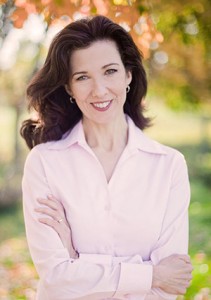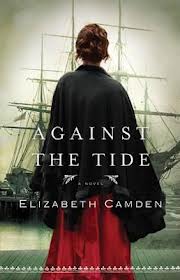If the pen is mightier than the sword, translators must be mighty indeed. Not only can they use their knowledge of language for functional ends, such as acting as a mid-point between two different entities, but their linguistic and cultural awareness offers them a valuable insight into other ways of being and living.
'Translators are attractive as lead characters because they have a unique point of access into another culture,' says Elizabeth Camden, whose latest book Against the Tide features a protagonist who works as a translator. 'Other characters depend on them to open that door.'
Language has often been a source of power, and with this in mind, Camden uses protagonist Lydia's skills as a way to allow her character to assert herself. In the novel her hero character is in desperate need of someone who can quickly learn an ancient Greek dialect in order to gain the upper hand over the villain.
'This puts the hero at Lydia's mercy, as she is simply the only person who can help him. Women of the 19th century were rarely in positions of power, but Lydia's language skills make her a sought-after asset.'
Elizabeth enjoys novels that feature leading characters who are intelligent and admirable, and says that the best way to create these sorts of characters is through sparkling dialogue, a sense of resourcefulnessand skills the average person does not possess.
'Being fluent in multiple languages certainly qualifies as a unique skill. The heroine in Against the Tide is fluent in six languages and is able to pick up another in the course of the book. This makes her an interesting character, and hints at her nomadic past when she lived all over the world.'
Translating romance to a wider audience
The act of reading is of course a type of translation in itself: readers interpret an author's work in terms of not only what's on the page, but also in terms of their own personal beliefs and life experiences.
For a romance novel to succeed, the author has to not only create a believable plot and setting, but to ensure that the reader is on-board with the romance as well.
This is a common phenomenon throughout genre fiction, Elizabeth says, although the particular element of the book that's key to a reader's enjoyment will vary depending on the genre.
'Although the ideal romance novel will have both a thrilling romance set in a wonderfully drawn setting with a great plot, the romance reader will always judge the success of the book by the love story.'
On the other hand, says Elizabeth, a sci-fi fan will forgive weak characters so long as the world-building is fantastic, and mystery fans will opt for a thrilling, complex mystery over a wonderfully drawn setting.
'Good genre fiction will have it allbut the only unforgivable sin is to shortchange the reader on the favorite aspect of their genre.'
Although Elizabeth loves crafting evocative, richly drawn settings, she puts most of her effort into creating the chemistry between the hero and heroine.
'I want it to dazzle, sparkle. They must complement one another's personality at the same time they challenge each other.'
At the same time, says Elizabeth, romance authors have to walk a fine line between ensuring that their characters have enough flaws to prevent the romance from too quick a resolution without peppering them with so many that the reader becomes alienated.
Elizabeth is wary of having her characters make 'silly choices' designed merely to drive the plot forward, and is very conscious of making her characters work to overcome their differences.
'Have you ever read a novel where the conflict between the hero and heroine could be solved by a simple honest conversation? There is no way I am going to let my characters off the hook so easily!'
Though Elizabeth's leading characters are always fiercely intelligent, she usually puts them through the wringer before they earn their happy ending.
'I love a good turbulent story with love, betrayal, heartbreak, all punctuated with periods of soaring joy and utter delight. That is what I aimed for with Against the Tide.'
On historical verisimilitude
Readers of historical romance are often treated, quite literally, to a sanitised version of history, with authors typically avoiding waxing lyrical about terrible hygiene, rampant disease and nonexistent plumbing.
Elizabeth is extremely knowledgeable about the eras in which she writes, but at the same time prefers to allow certain less pleasant elements remain in the backgroundmuch as, she says, people of the times turned a blind eye to such things as best they could.
'We all know that people of earlier eras probably suffered from bad teeth, pock-marked skin, and open sewage lines running through the cities, but I don't dwell on these things. Quite frankly, when you read the diaries and letters from people written during these eras, they didn't either! I figure that gives me permission to ignore it.'
The only area where Elizabeth makes a conscious decision to overlook certain historical attitudes is in regard to rampant racism or sexism.
'I know it existed, and that it was the rare individual who did not share those attitudes. My characters don't. I have no stomach for it. I don't shy away from subjecting my characters to the challenges of racism or sexism thrown in their path, but I always equip them with the intellect and resilience to overcome the obstacles.'
Elizabeth's books are set during gilded age America, a time where women were beginning to enter the workforce in professional roles, and she has enjoyed making the most of what this era has to offer.
'Lydia from Against the Tide is a translator. Clara from The Lady of Bolton Hill was a journalist. The heroine from my upcoming book is a watchmaker. These professions might run contrary to what readers expect to see in a historical novel, but we know from historical records that women participated in all of these professions. Typical? Perhaps not, but typical heroines tend to be dull!'
Dull is not something to which Elizabeth aspires, and between her writing and her work in a university library she finds plenty of curiosities on which to draw.
'What a conglomeration of crazy dreamers, artists, activists, lost souls, socially awkward professors!' she says.
'I suppose it is a microcosm of the real world, but I get a front row seat to interact with some amazing people. I get to meet some of the most interesting people in the world, and some of the oddest as well. On any given day it is pretty easy to find inspiration merely by looking outside my office door.'
And Elizabeth is certainly inspired: she's hard at work on her next novel, Into the Whirlwind, to be released in August 2013. The novel is set during the great Chicago fire of 1871.
'It is mostly a love story, but also traces the monumental changes that happened to the city as a result of the fire. The way Chicago emerged from the ashes was a truly fascinating story. Although the city was brought to its knees by the devastation, it was the first crisis in American history in which the nation banded together and helped restore a city. The book is about the resilience of a community working together in a time of crisis to rebuild their city.'
About Elizabeth Camden:
A research librarian and associate professor, Elizabeth Camden has a master's in history from the University of Virginia and a master's in library science from Indiana University. She has published several articles for academic publications and is the author of four nonfiction history books. Her ongoing fascination with history and love of literature have led her to write inspirational fiction. Elizabeth lives with her husband in central Florida.
About Against the Tide:
Boston of 1891 is a city of hope and ambition, where mariners, merchants, and dreamers thrive in the cobblestone streets of America's most historic city. Within the harbor of Boston's naval shipyard, Lydia Pallas has become a trusted assistant to an Admiral in the U.S. Navy. Fluent in seven languages, she spends her days translating documents from all over the world.
Lydia's remarkable language skills bring her to the attention of Alexander Banebridge, a mysterious man on a quest to rid the world of the scourge of opium. Only Lydia has the rare combination of language skills and courage he needs to advance his cause. A man as coolly analytical as he is relentless, Bane never bargained on falling in love with Lydia. As he battles the bittersweet love that grows between them, Bane's mission will take Lydia away from everything'and everyone'she ever held dear.
With fast-paced intrigue and unforgettable characters, Against the Tide is Elizabeth Camden's most romantic novel yet.
Visit Elizabeths website | Facebook
Purchase Against the Tide from
Amazon | Book Depository UK | Book Depository USA | Booktopia | The Nile












This book intrigues! Also, I love this: 'Good genre fiction will have it all'but the only unforgivable sin is to shortchange the reader on the favorite aspect of their genre.' So true.
Its a very insightful comment, I agree, and something that has really got me thinking about my own reading preferences and how they can also be influenced by genre. Id forgive a romance bad science, but not a bad romance, whereas the opposite would probably be true in a sci-fi book (and historically this has been true of my reading!).
I agree. I do forgive some missing points in certain genres because I am looking for specific elements to be met. Which is why Im always pleased when a book perfectly balances every aspect. Or maybe doesnt try to do it all. The Rook was assuredly one of the best written books Ive read this year. The world building, character development, science fiction aspects, and plot were exceptionally portrayed that a romance wasnt needed and no attempt was made to make one work. Such a good book.
Ive heard of The Rook but havent read itIll have to keep an eye out. Very interesting that it doesnt have a romance element, as romance is so often a part, and often a central part, of great books.